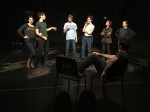It’s 1944 in Los Angeles. A couple dressed in glittery evening wear strolls into the glamorous Carnesale Club, where they are greeted by four detectives in the midst of an investigation: catching the killer of a Hollywood legend.
This play, “Murder in the Key of G” – the first completely student-run murder mystery program from the On-Campus Housing Council – will take place Friday at 8 p.m. in Carnesale Commons.
In the past, OCHC hired outside theater companies specializing in murder mystery productions to put on the event, said Leland Frankel, co-producer and co-writer of the show and a third-year theater student in the School of Theater, Film and Television.
Aside from hair and makeup, which is being done by an outside company, the students will run everything. Sarit Rathbone, co-producer and co-writer of the show and a fourth-year theater student, and M.J. Watz, director of the show and a fifth-year theater student, found the costumes online by thinking about colors and patterns for particular characters.
Frankel said this is the first year that OCHC reached out to the UCLA community for student writers, actors, directors and producers.
“Instead of paying an exorbitant fee to an outside company, we’re doing it ourselves to give students the opportunity to get involved and see their friends as they perform,” Frankel said.
Murder mystery is a type of theater in which the actors mingle with the audience to tell the story and get help solving the mystery.
Audience interaction with the actors onstage is an integral part of the production. Breaks in the script allow the performance to involve audience members, whether it’s for help with finding a murder weapon or answering a trivia question to unlock a door.
The audience also has an important responsibility at the end of the play: the determination of the killer’s identity.
“We don’t just want watchers. We want active participants,” Frankel said.
The process of creating the show began mid-fall quarter, when Frankel asked Rathbone to write the script and produce the show with him.
Rathbone, who had acted in murder mysteries before but never written one, said she was intrigued by the collaboration.
Rathbone and Frankel synthesized their ideas into a plot synopsis, then took turns writing disparate scenes in greater detail.
Knowing that one of their greatest challenges would be coordinating everyone’s busy schedules, the two decided to cast their characters early, holding auditions at the end of winter quarter, Frankel said.
Most of the cast has worked with Frankel before, in TFT productions or through the theater or improvisation groups on campus, and learned about the project through him, his Facebook posts or word of mouth.
Frankel and Rathbone brought on Watz as director during early winter quarter.
Watz said she was in a prop-making class with Frankel in fall quarter and always wanted to work with him, especially since she was drawn to the murder mystery concept.
“I like the noir genre a lot. I like it for its political tie-ins,” Watz said. “The era and the aesthetic is really beautiful.”
The notion of audience participation was exciting for her because she studied interactive digital media and was interested in expanding that concept into theater, Watz said. She added that working on a stage production is very different from working in film.
“Usually when I work in film, I’m pretty stylistic and I have a definite imprint on my work,” Watz said. “But for this … I’ve taken on a more managerial than stylistic approach.”
Although the show has a set script, the writers encouraged the actors to improvise and flesh out their characters for themselves with ad-libs and other, more personal, touches.
“It’s letting go of control, which can be scary,” Rathbone said. “But I have complete faith in this team.”
Landen Baldwin, a third-year linguistics student, said he was drawn to the production for its emphasis on improvisation as well as the farcical nature of the detective mystery.
“Every character in the show is rooted in this archetypal trope and then amplified a lot,” Baldwin said. “Everyone is a very recognizable cliche, (which is) brought out to the fullest.”
The group has held four rehearsals, condensing a lot of the work into several sessions.
“It’s a quick passion project,” Rathbone said.
Rathbone and Frankel said they were excited that the show would be the first of its kind for UCLA.
“We want to create a good precedent as the first (OCHC) student production,” Rathbone said.
